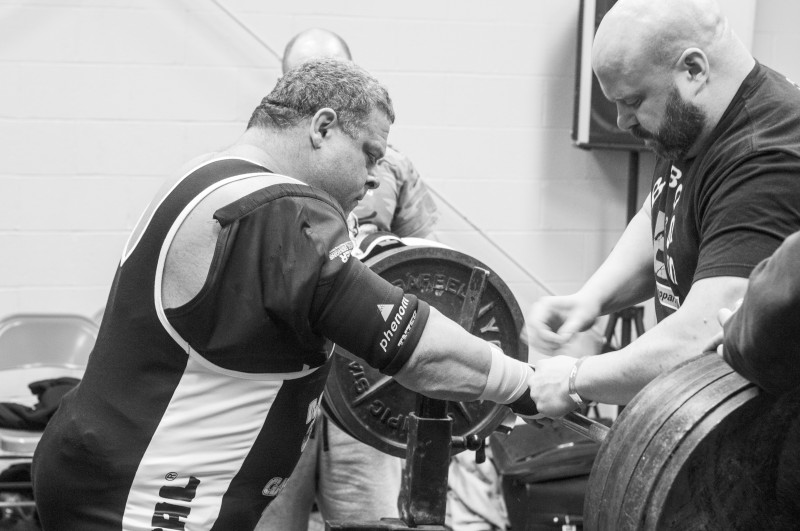
I’ve been a competitive powerlifter for 16 years. In fact, I recently dug up some old plaques, trophies and medals, most of which I had even forgotten I had competed at. Some had memorable moments for sure. But along the way, you learn a few things. Most of what’s learned (just like in life) is from mistakes and errors which you realize after the fact. And if you’re smart, you fix them for the next meet.
Being a competitive athlete and a coach, I am on both sides. I’ve done things wrong (okay, maybe not wrong, but not the best or most efficient) and as a coach I’ve watched my competitors do silly things too. Most of the time, I can pull them out and get them back on track before the damage is done.
I had a lifter compete a couple weeks ago. I have some more competing in a couple weeks. And I am competing myself next weekend as well. As I’ve prepared my own lifters and myself, I’ve been thinking about all the things that pop up the week or two before a meet: weighing in, what to bring, what to eat, how much water, when to cut, what to wear. Someone always freaks out about cutting weight and it’s usually nothing to freak out about. So, here are a few things you DON’T want to do going into a meet.
1. Don’t start cutting weight too soon.
This is very common for newbie lifters. “Oh no, I’m 2 pounds over. I have to make weight in 2 weeks.” Bring on the cardio and drop the carbs, right? No. Please don’t do that. In fact, for my first timers, I don’t even have them cut weight. Second, most of my females I get to within five pounds of their weight class about 7-9 days out. Most women, even smaller women, can do a 5-7 pound water cut EASY. And it’s a small enough number that the lifter doesn’t freak out either. More experienced competitors can certainly cut more. Your goal should be to weigh in RIGHT at weight and then get back to your normal training weight quickly. Coaches and athletes: make sure it’s a cut that is not only physically doable, but mentally as well.
2. Don’t do a different warm-up on meet day.
If you don’t foam roll for 20 minutes before squats on a normal training day, then why are you doing it meet day? Keep your shit the same. If your normal warm-up is 5-10 minutes of some dynamic stretching, then do that. Don’t go nuts just because it’s meet day or because you need to waste some time before your flight.
3. Don’t reconstitute like a knucklehead.
Yes, carbs are your friend. Yes, fluids are needed. Yes, salt and electrolytes come into play. But for simplicity sake, just look at the food part. Be smart. Think about what you normally eat. Then strategically have snacks and another meal or two in there that are more “cheat-like.” For example, I eat a lot of ground beef, chicken, rice, potatoes, sweet potatoes, etc. So a lot of my post weigh-in meals are burgers and fries, breakfast foods, and salty snacks. Gobs of candy/sugary stuff and foods that don’t agree with you are just silly. Know what your body trains best on and stick to things close to that. If you cut a lot, then you better know how to your weight back up quickly and efficiently and still feel good.
4. Don’t do anything stupid in the gym.
Unfortunately, that needs to be said. NONE of my competitors like to take the week of the meet to rest. “I’m going to get weaker. I feel like I’m not doing anything.” Shush it. Nothing can be done in the five days before a meet to make you stronger. But you can do something stupid and kill your recovery or worse yet, get hurt. Your heavy attempts are done (and should be 10-14 days out) and if you’re using gear (squat suits and bench shirts), then there’s no reason to be stuffing into the gear the week before either. All the heavies and all the technical stuff should be ironed out by then. It’s time to rest.
5. Don’t assume the meet will run smoothly.
Don't assume start times. Don’t assume the flights. Don’t assume anything. Ask the meet director if you’re not sure of something. If it’s 30 minutes before the so-called start time and there’s barely a soul in the building, find someone right away to see what’s going on. You don’t want to warm-up, then have them come in and tell you they have delayed the start time. It happens a LOT, so you have to be ready both ways. Point is, ask questions and be in the know. Know how much break time between lifts/flights. Know how many flights. Know if there’s a bench only flight mixed in. Better yet, have your handler be in the know. Make them run around and find out what’s going on. Good handlers and good coaches make all the difference.
6. Don't forget what time zone you're lifting in.
This one only matters if you're traveling across the country for a meet. One time zone over is probably not a big deal. Three time zones over and you’ll want to make some adjustments. In 2006 I competed in Las Vegas at the APF Nationals. They decided to showcase the women by putting them in the second session of the day (which I hate. I’d rather start first thing). So squats started early afternoon and by the time we got to deadlifts, it was about 8:30 PM Vegas time and I was currently living on east coast time. Calculation: I was deadlifting at 11:30 at night by my body’s clock. I was in the warm-up area practically asleep. Take all those factors into consideration.
Meets are a blast. And as a newer lifter, you may not realize all the little quirks that go on during a meet. It’s always beneficial to have a coach or handler who is experienced with competing to guide you along, from your weight cut to your food to warm-ups and attempts. Good luck and crush weights!











